MercoPress. South Atlantic News Agency
Tag: Mauricio Macri
-
Thursday, September 13th 2018 - 10:34 UTC
Argentine labor unions and social groups protest austerity measures in Buenos Aires City
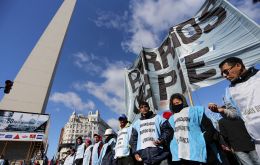
Labor unions and social groups blocked streets in downtown Buenos Aires on Wednesday, with more marches planned over the days ahead over austerity measures proposed by the government and backed by the International Monetary Fund. Protesters are angry about the belt-tightening policies, which are cutting services to low-income Argentines already walloped by inflation of 31 percent and climbing.
-
Wednesday, September 12th 2018 - 08:55 UTC
Argentina's central bank keeps key interest rate at 60%
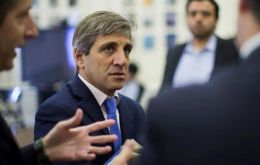
Argentina's central bank kept its key interest rate on Wednesday at 60%, one of the highest in the world, following a surprise hike two weeks ago after the peso plunged. Central bank officials said in a statement that inflation accelerated in August and continues to do so September, citing high-frequency data.
-
Wednesday, September 12th 2018 - 08:13 UTC
Argentina equities and Peso slide, in line with Brazil's political situation
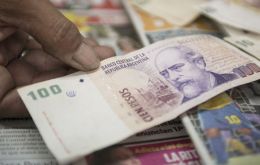
Argentine equities and the Peso continued on Tuesday their slide amid global trade tensions, uncertainty about Argentina's 2019 fiscal budget, talks between the government and the International Monetary Fund and the political situation in Brazil, which together with China are Argentina's main trade partners
-
Tuesday, September 11th 2018 - 09:50 UTC
Macri will receive the Global Citizen Award for his commitment to economic reform
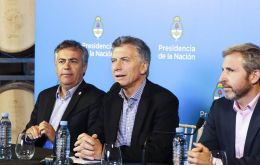
Mauricio Macri, president of Argentina, Erna Solberg, Prime Minister of Norway and Hamdi Ulukaya, founder, chairman and CEO of Chobani and founder of the Tent Partnership for Refugees, will be honored by the Atlantic Council with the Global Citizen Awards, during a ceremony on the evening of September 24 in New York, NY. All three distinguished honorees have confirmed attendance and will speak at the event.
-
Tuesday, September 11th 2018 - 09:12 UTC
Argentine equities and Peso lose ground on Monday: IMF and budget concerns
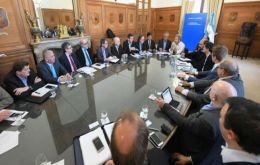
Argentine equities and the peso both lost ground on Monday as analysts said intervention in the foreign exchange market by the nation's central bank may prove less successful than originally hoped.
-
Tuesday, September 11th 2018 - 08:13 UTC
Argentina raises 17% price of biodiesel used in domestic fuel mixes

Argentina raised the price of biodiesel used in domestic fuel mixes in response to a sharp devaluation in the Peso currency and new taxes on primary exports, the government said in its official gazette on Monday.
-
Saturday, September 8th 2018 - 09:11 UTC
Argentine Peso and markets end the week positively; “sufficient financing in 2019” says central bank
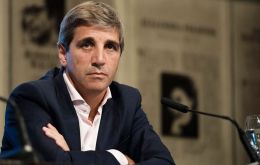
Argentina’s central bank governor, Luis Caputo, said on Friday that government financing for 2019 was more than sufficient and that high yields on the country’s sovereign debt were “exaggerated,” prompting the peso currency to reverse earlier
-
Friday, September 7th 2018 - 09:18 UTC
IMF wants to wrap up talks to financially support Argentina “as rapidly as possible”
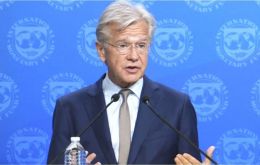
The International Monetary Fund said on Thursday it aimed to wrap up talks to “strengthen” a US$ 50 billion backup financing deal with Argentina “as rapidly as possible,” as the country's peso and stocks climbed for a second straight day.
-
Thursday, September 6th 2018 - 08:40 UTC
IMF receptive to Argentina's request, but now Macri must implement the hard austerity program
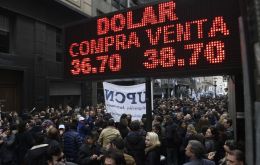
Argentina’s economy minister sounded upbeat on Wednesday about clinching a new deal with the International Monetary Fund after two days of talks in Washington, and said had sought U.S. support for securing approval from the IMF’s board.
-
Wednesday, September 5th 2018 - 08:16 UTC
Argentine Peso slid another 2.18% and the Central bank sold US$ 350 million in reserves
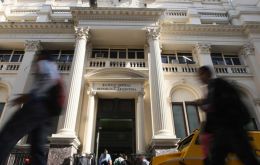
Argentina’s peso slid further on Tuesday as investors reacted with skepticism to president Mauricio Macri’s plans. Many worry he will not be able to push reforms through a restive Congress amid growing frustration on the streets of Buenos Aires.
